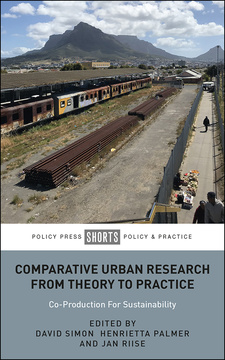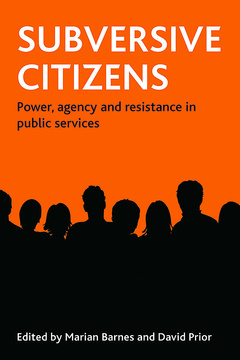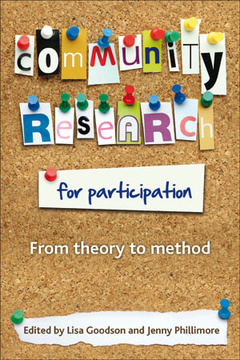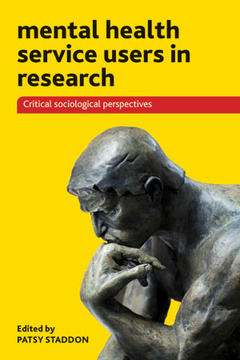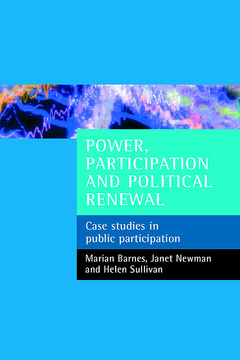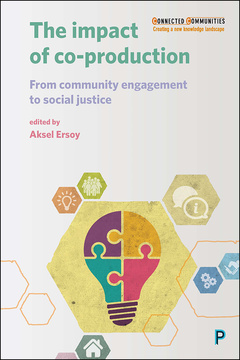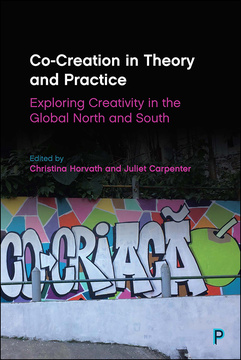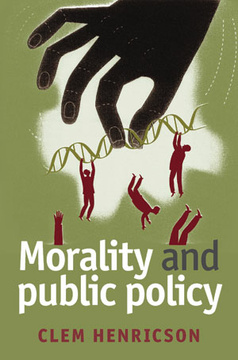Designing Public Policy for Co-production
Theory, Practice and Change
By Catherine Durose and Liz Richardson
Published
Nov 11, 2015Page count
176 pagesISBN
978-1447316954Dimensions
234 x 156 mmImprint
Policy PressPublished
Nov 11, 2015Page count
176 pagesISBN
978-1447316695Dimensions
234 x 156 mmImprint
Policy PressPublished
Nov 11, 2015Page count
176 pagesISBN
978-1447322252Imprint
Policy PressPublished
Nov 11, 2015Page count
176 pagesISBN
978-1447322269Imprint
Policy PressThis important book is a response to crises of public policy. Offering an original contribution to a growing debate, the authors argue that traditional technocratic ways of designing policy are inadequate to cope with increasingly complex challenges, and suggest co-production as a more democratic alternative. Drawing on 12 compelling international contributions from practitioners, policy makers, activists and actively engaged academics, ideas of power are used to explore how genuine democratic involvement in the policy process from those outside the elites of politics can shape society for the better. The authors present insights on why and how to generate change in policy processes, arguing for increased experimentation in policy design. The book will be a valuable resource for researchers and students in public policy, public administration, sociology and politics.
"An important contribution at the forefront of debates about the future of public policy and public services. The authors have assembled an impressive range of contributors and skilfully drawn together a narrative that convincingly integrates theory and practice" Janet Newman, The Open University
"This accessible text on co-production is long overdue. It draws together academic, policy and practice insights to advance knowledge and thinking in relation to participatory policy making and research." Lisa Goodson, University of Birmingham
"An excellent analysis of the policy process, why it doesn’t work and how it can work. With a focus on design principles, it brings together a strong cast of contributors from the academic, policy and practice worlds to show what an intelligent approach to co-production really means. Essential reading." Marilyn Taylor, Institute for Voluntary Action Research and University of the West of England
Catherine Durose is senior lecturer in the Institute of Local Government Studies (INLOGOV) at the University of Birmingham, UK. Her work analyses the practices and politics of relationships between the state, communities and citizens.
Liz Richardson is senior lecturer in politics at the University of Manchester, UK. Her work is dedicated to experimenting with how academics, practitioners and citizens can develop more democratic and participatory ways of doing politics.
Introduction: Why is redesign of public policy needed?
Chapter One: Possibilities for policy design;
Chapter Two: Conventional policy design
Chapter Three: Co-productive policy design
Section One • Challenges and Change Within Conventional Policy Design:
Can crisis ever be good for policy design? ~ Katy Wilkinson;
Challenges in policy redesign ~ Paul McCabe;
The hidden politics of policy design ~ Simon Burall and Tim Hughes;
Designing policy for localism ~ Robert Rutherfoord and Lucy Spurling;
Creative disruption for cultural change ~ Toby Blume;
Section Two • Vision in Co-Productive Policy Design:
Establishing principles for value-driven policy ~ Teresa Córdova and Moises Gonzales;
Doing politics to build power and change policy ~ Jess Steele;
Participatory action research and policy change ~ Brett G. Stoudt, María Elena Torre, Paul Bartley, Fawn Bracy, Hillary Caldwell, Anthony Downs, Cory Greene, Jan Haldipur, Prakriti Hassan, Einat Manoff, Nadine Sheppard and Jacqueline Yates;
Section Three • Grammar in Co-Productive Policy Design:
Using technology to help communities shout louder ~ Phil Jones, Colin Lorne and Chris Speed ;
Generating community conversations ~ Amina Lone and Dan Silver;
Policy design as co-design ~ Michaela Howell and Margaret Wilkinson;
Using mediation to resolve conflict ~ Maura Rose;
Chapter Four: Debating co-productive policy design
Chapter Five: Governance for co-productive policy designs
Epilogue: Co-producing research.










